I want to compute the SHA256 fingerprint for the Public Key of a X509Certificate2 object in c#. The following code is used as suggested in this post (however I need it for the public key):
using (var hasher = SHA256.Create())
{
var hash = hasher.ComputeHash(cert.PublicKey.EncodedKeyValue.RawData);
string fingerprint = BitConverter.ToString(hash);
}
The output for a specific certificate is
26a7d549af907d9a740813bef4a98757ad6a4da100e9696ef7b22459eb32207a
But GNUTLS computes in a different way.
#gnutls-cli --print-cert <CERTIFICATE>
- Certificate type: X.509
- Got a certificate list of 1 certificates.
- Certificate[0] info:
- subject `O=XXXX,CN=XXXX', issuer `O=XXXX,CN=XXX', serial 0x56XXXX1, RSA key 2432 bits, signed using RSA-SHA256, activated `2016-02-06 19:06:57 UTC', expires `XXXX-XX-XX 23:59:59 UTC', pin-sha256="G2Z1XXXXXXXXXXX50/Qxk="
Public Key ID:
sha1:7c1d4151620093f11xxxx220ba3d705d75c06dfb
sha256:1b6675c7e0567xxxxxxx03e279684897fb0606dc55b5c940036562c79d3f4319
Public Key PIN:
pin-sha256:G2Z1x+BWxxxxxxxxxxhIl/sGBtxVtclAA2Vix50/Qxk=
Public key's random art:
+--[ RSA 2432]----+
| ++.+B=. |
| .o .oo+ |
| o..o . |
| . .= .. |
| ..S.o o . |
| .....o . E|
| .o . o |
| o. o |
| . .. |
+-----------------+
-----BEGIN CERTIFICATE-----
MIIDyDCCAoCgAwIBAgIEVrZEUTANBgkqhkiG9w0BAQsFADAkMQ8wDQYDVQQDEwZW
...
...
c0TLqiTJQJe55Rf/k/luygGEmoGbIonC8zC/iB8XoieWzH3F0k1yI4YEU8nLhGXq
Kz0SKPX/SPWywRLY
-----END CERTIFICATE-----
From My Code: 26a7d549af907d9a740813bef4a98757ad6a4da100e9696ef7b22459eb32207a
From gnutls: 1b6675c7e0567xxxxxxx03e279684897fb0606dc55b5c940036562c79d3f4319
I have checked other ways to elaborate what happens. Using this post I used this to compute what is the public key data:
# openssl s_client -connect <HTTPS_URL_WITH_THE_CERT> | openssl x509 -pubkey -noout | openssl rsa -pubin -outform der | xxd
30820152300d06092a864886f70d01010105000382013f003082013a0282013100ca4602d7440461f2d3efe5c3f1f182a269319644b7ff989bd4cd44964f0002c6d0217da845db2c3801fc4be72d7e85510a2dd8e4cbd210cce4dd8c20c6925f0bc88b87b2a9653ffa3b700131da0a46aa20598e7fa452ee0e28648ee23da25ad68cf7f47c866990d05e17e110a230801d0d3c03b6de750e27d14a50c99455fdc339c7988d5b957dee17db47044aaa38327bc42a8bd22d550b484a33c0efbe2c07ba7f8c18c19cab81c4fa4325267a96501586c017da2c50fa65cf073502230659a0fbf7fa3af9335a3b94ff285fc5341e211f04b7bce0688eb157840e7ea04f79c88b491241996b8f166e1aaaf9920e901b583c8449bb92e2b3d4db55b8b541e9f531f1bac6528a03eaf756366c045a6e8b8637a3942bd2d8bf8a0d522061cfe416e7aba684cdcac7cf637048c4b865ff0203010001
But when I run BitConverter.ToString(cert.PublicKey.EncodedKeyValue.RawData) I get this:
3082013A0282013100CA4602D7440461F2D3EFE5C3F1F182A269319644B7FF989BD4CD44964F0002C6D0217DA845DB2C3801FC4BE72D7E85510A2DD8E4CBD210CCE4DD8C20C6925F0BC88B87B2A9653FFA3B700131DA0A46AA20598E7FA452EE0E28648EE23DA25AD68CF7F47C866990D05E17E110A230801D0D3C03B6DE750E27D14A50C99455FDC339C7988D5B957DEE17DB47044AAA38327BC42A8BD22D550B484A33C0EFBE2C07BA7F8C18C19CAB81C4FA4325267A96501586C017DA2C50FA65CF073502230659A0FBF7FA3AF9335A3B94FF285FC5341E211F04B7BCE0688EB157840E7EA04F79C88B491241996B8F166E1AAAF9920E901B583C8449BB92E2B3D4DB55B8B541E9F531F1BAC6528A03EAF756366C045A6E8B8637A3942BD2D8BF8A0D522061CFE416E7ABA684CDCAC7CF637048C4B865FF0203010001
Which has less 24 bytes compared to previous command.
30820152300d06092a864886f70d01010105000382013f00
=> missing data in public key in C# code
Update 1
Thanks to tapaco, I checked the certificate with the tool, and I realized that the missing part seems to be the encapsulation part of the key.

Is there anything missing here?
Update 2
I used the following code and it matches the gnutls signature.
Asn1InputStream bIn = new Asn1InputStream(cert.RawData);
DerSequence seq = bIn.ReadObject() as DerSequence;
string signature = BitConverter.ToString(SHA256.Create().ComputeHash(((DerSequence)seq[0].ToAsn1Object())[6].GetEncoded()));
// 1b6675c7e0567xxxxxxx03e279684897fb0606dc55b5c940036562c79d3f4319
But I don't know if it works in all cases.
